- Home
- Allison Brennan
No Good Deed Page 3
No Good Deed Read online
Page 3
“They’re gone. Helicopter lifted off from a soccer field two miles from the explosion. We have multiple witnesses—they couldn’t identify Nicole from her photo, but agree there was a pilot plus a man and a woman.” He squeezed his fists together and said through clenched teeth, “Tobias was behind this.”
“Maybe.”
He stared at her as if she were speaking in a foreign language. “Maybe? Who else?”
“Nicole herself.”
“He’s in charge. We knew that from the beginning, from when you overheard him three months ago threatening Vasco Trejo. He’s the one who orchestrated the slaughter of his rival gang. He ordered the hit on Worthington less than two weeks ago. He bombed the DEA evidence locker. It’s him.”
“He’s involved, but she’s important. He wouldn’t spring her if she were a nobody.”
“She knows too much. He had to get her out.”
“Then why not kill her? It was easy enough to kill the guards, to plant a bomb on a church school bus. If Tobias wanted her dead, Brad, she’d be dead.”
Lucy didn’t know when she’d come to that conclusion—it might have been formulating over the last two weeks, since the explosion at the DEA evidence locker; it might have been even longer, when they first took Nicole down. There was something about her that told Lucy she was a player, not a follower.
“Lucy,” Brad said, then stopped as the truth sank in. “You’re saying she wasn’t just an agent on the take.”
“No. She’s the ringleader. I’d bet my badge on it.”
CHAPTER THREE
Lucy tended to several minor injuries while the paramedics triaged the most serious. Most of the injuries were related to the explosion—cuts, burns, scrapes. Two bystanders who’d been hit by stray bullets during the initial gunfire had already been transported to the hospital before Lucy and her team arrived.
Five people involved with the transport had been killed—three guards in the van, and the two DEA agents in the rear SUV. The lead SUV had two US Marshals; they’d both been incapacitated and were in stable condition at the hospital.
Less than an hour after the explosion, the fire was completely out and arson investigators had begun processing the scene. SWAT were methodically clearing each building. SAPD were retrieving all security cameras from the area so they could piece together a visual of what happened, and the FBI were interviewing witnesses.
Lucy spotted Father Mateo Flannigan as he walked from the staging area to the restaurant where the children were. She caught up to him and put a hand on his arm. “Tell me what you need, Father.”
He rested his hand on hers and squeezed. His face was pale and drawn, his eyes troubled, but he was calm when he said, “I need the children away from here.”
“Have their parents been notified?”
“My staff has been working with the police to contact parents. They said forty children came off the bus. I confirmed that two students, brothers, stayed home today.”
“Sick?”
“I didn’t ask. I spoke to their grandmother and she said their mother dropped them off this morning. Why is it important? We know they weren’t on the bus. This should be good news.”
It might be nothing, but investigators needed to check out all anomalies. “I need their contact information.”
“I gave it to your people. Lucy, I know you’re doing your job, but the kids need me now. And I need them.”
“Of course.” Lucy stepped aside and let Father Mateo console his flock. She’d done all that she could here. She watched as Officer Isaac Harris hugged a petite woman who clutched Mary in her arms. Her mother? That would give Isaac some peace, she hoped.
Lucy walked back to the staging area and found Leo Proctor, who was coordinating all the SWAT teams—FBI, SAPD, and DEA. “I need an agent to check something out,” she said. “It might be important.”
“DEA is lead on the investigation, marshals are running the manhunt. What’s going on?”
“Father Mateo Flannigan, the head pastor at Saint Catherine’s, said that two boys who were supposed to be on the bus went to their grandmother’s instead.”
“And?” He sounded rushed and irritated.
“Gut feeling. They may be sick, but we won’t know until we check with their family. Father Flannigan spoke to their grandmother but he may not have asked the right questions.”
“Give the intel to the DEA, then report to Casilla.”
Lucy couldn’t find Brad in the immediate area, so she sent him a text message about the boys. She went back to the restaurant, where parents had started arriving to pick up their children. At a table both SAPD officers and civilian staff were recording everyone’s information, verifying identification, and releasing the children. Father Mateo helped facilitate the process.
None of those children would ever be the same. A burning anger filled Lucy. Nicole Rollins had stolen their innocence. She’d set this entire thing up with full knowledge that the kids would be traumatized and possibly killed. Her sole motivation was to escape. Five dead cops and dozens injured.
How could Nicole have ever become a DEA agent? How could she work for more than a decade in a profession she detested? How could she see what violence did to the victims and then perpetuate it herself? When Lucy first met her, while they worked together on Operation Heatwave, she’d thought Nicole was smart, methodical, and a bit cold. A lot of cops—especially those who had high-stress jobs—could be icy. Lucy was herself aloof, especially when processing a crime scene. She saw the scene through the eyes of the killer as well as the victim in order to not only understand the victimology, but to capture the killer.
She could understand Nicole if she wanted to get into her head, but Lucy hesitated. Going so deep into the criminal psyche was unfortunately easy for her, but it took its toll. Still, such analysis was one thing she was particularly good at, and understanding Nicole’s plan and why might be the best way for Lucy to help find her.
But what really bothered her, over and above what had happened here today, was how Nicole could spend so many years in law enforcement and yet no one knew her true self. She was able to fool many people for many years. How was she recruited in the first place? What was her background? When did she turn? Was there one incident that had her changing allegiances from the agency that trusted her to a violent criminal organization? Or was it a gradual process?
Lucy walked over to where the fire department had cordoned off the smoldering bus. She overheard the chief report that they had found one body, an adult female. No children had died today.
The death toll could have been so much higher. Lucy would never forget or forgive Nicole. She’d killed an innocent person and five law enforcement officers who were simply doing their job.
She flashed her badge and walked under the crime scene tape to get a closer look at the transport van. The bulletproof glass had been shattered by repetitive, high-velocity firepower. The three dead guards had been removed; they lay on the ground under yellow tarps. The bodies of the two DEA agents from the SUV were down the street under similar tarps. They’d be removed as soon as the coroner arrived. The FBI Evidence Response Team and SAPD were processing the scene; cards with numbers littered the street and vehicles—the highest number she saw was seventy-nine, but there seemed to be over a hundred placards.
Lucy stood next to the driver’s door and surveyed the immediate area. The bus had blocked the intersection, separating the lead SUV from the van. This intersection was ideal to set up the trap. They were driving on a narrow two-lane street heading into a four-way intersection. There was no easy way for the large van to turn around. The attack had occurred at approximately eight fifty a.m., a busy commute time.
The two US Marshals had been incapacitated but not killed. Why incapacitate the Marshals but kill the two DEA agents?
Had the transport driver been suspicious? If so, he would have contacted the support teams—but they’d already been taken out.
Lucy saw the scene viv
idly. The bus stops in the intersection. Gunmen exit, shoot out the window, kill the guards. Fast. Everything happened fast, perfectly timed. No one alerted SAPD or the respective federal agencies prior to the shooting. Blocked communications. No sense of danger until it was too late.
Kill the two guards in the cab. Open the van. Nicole knew what the plan was because she told Isaac he had ten seconds to comply or children would start to die. He complied. Nicole walked free, but to avoid being followed she told Isaac he had five minutes, twenty seconds to get the children to safety.
Giving Nicole and her men enough time to escape.
They could have killed everyone and still had time to escape. Why put the bomb on the bus? Was it more than a distraction? Was there another reason to set off the bomb?
Donnelly reported that only two individuals, a man and woman, boarded a helicopter right after the explosion. Was the bomb also a way to distract first responders from hunting them down? If Isaac had time to alert anyone before he rescued the kids, there was a slim chance Nicole could have been apprehended en route to the helicopter. But she didn’t give him the time. And after a disaster—like an explosion—all resources and personnel would rush to the point of origin.
When had the gunmen boarded? They couldn’t have been hiding on the bus—there would be no place that the children wouldn’t see them. They must have boarded with the last of the children—or hijacked the bus near the end of the route when the missing boys were supposed to be picked up.
She took out her notepad and scribbled her observations. In all likelihood, the lead agents were already following this avenue of investigation, but she didn’t want to miss anything. With emotions running high and an escaped felon on the loose, they may not have thought beyond tracking Nicole Rollins’s footsteps.
Lucy glanced at her small, neat block letters. While others were running on anger, grief, or determination, she was standing here methodically—coldly—putting together pieces of a puzzle. It had to be done, and she knew she was good at it, but her lack of emotion disturbed her. She blocked out everything except the evidence and the psychology. It bothered her because it was becoming harder and harder for her to connect with people. There seemed to be a wall between her and everyone else. Like Kenzie. She liked Kenzie, but sharing her feelings—like her happiness about her engagement—felt unnatural.
Analyzing the crime scene, getting into Nicole’s head, figuring out how all the pieces fit together—that felt natural.
There was something wrong with her.
No. It’s not wrong. It’s who you are. Accept yourself as you are.
Just this morning she was thinking she had. And then something like this happened and she once again felt disconnected from everyone else.
Only Sean didn’t make her feel abnormal. She closed her eyes and remembered their weekend. Remembered that it was okay to be different. That her unique skills would help the FBI and DEA find Nicole Rollins. She breathed deeply and let the calm take over.
“Lucy,” Brad said.
She opened her eyes. Brad was both angry and grieving, but keeping his emotions under tight control.
“You said you had something,” he said.
She handed him the paper with the names of the two missing boys and their grandmother’s address. “They didn’t get on the bus. Father Mateo didn’t know why, he thought they might be sick. He spoke briefly with their grandmother when his head count didn’t match the number on the bus.”
“I’ll send someone to check it out later.”
“Why didn’t they get on the bus?”
“Who cares?” Now Brad’s irritability came through. She couldn’t blame him.
“What if someone related to them is involved? Nicole knew about the bus, knew the route, knew where and how to get on and how the bus intersected with the prison transport—or how to divert the bus without drawing attention. They could have created the plan by observing the bus routine for a few days, but it would be easier and more reliable to have someone on the inside. How? At the last stop? What if these boys were supposed to be at one of the stops but the driver didn’t know they wouldn’t be and the gunmen hijacked the bus?”
“Shit.” Brad ran a hand over his face. “Okay, I see it. We’ve pulled all the security feeds and our tech people are putting them together, but that takes time and equipment, so it’s all going back to headquarters for processing. Debriefing in—” he glanced at his watch “—about ninety minutes. That should give us time to follow-up with these kids.”
“I need to report to Casilla.”
“I’ll ask him if I can use you for the duration.”
Lucy would do anything to help, but she also recognized that her boss had only recently begun to trust her again after a series of events that necessitated her violating protocol and engaging in a rescue mission south of the border. Brad had been a part of that. “Are you sure?”
“Lucy, you’re the only one I trust. Nicole had someone on the inside—she couldn’t have planned and executed this escape without help. The day and time of the transport could have come from her attorney, but the route—you’re right, that was limited knowledge and decided at the last minute. She wasn’t told.”
“She could have guessed.”
“Yeah, but there are three preset routes from the jail to the courthouse. She couldn’t have known which one we’d choose.”
Brad and Lucy walked back toward the staging area where they spotted Juan Casilla talking with Samantha Archer, Juan’s counterpart at the DEA, and the SAPD chief of police, Milton Turner. “Stay here,” Brad said.
Lucy watched as Brad talked to the group. She couldn’t hear what they were saying, but Brad did most of the talking. No one looked at her. Two minutes later he shook Juan’s hand, then approached Lucy. “You’re with me.”
“That was fast.”
“I told the truth. We have a mole and I trust you. I didn’t need to convince Juan so much as Sam. I don’t know why she doesn’t see it—I think she’s in shock.”
“She lost two men today,” Lucy said. She needed to talk to Juan to make sure this really was okay with him—their working relationship had been better over the last couple of weeks, but it was still not the same and she feared it would never be.
“We both need to be at the meeting at FBI headquarters later—a multi-jurisdictional clusterfuck if you ask me, but better that we all know who’s doing what so we don’t miss anything.”
“I’m surprised Sam Archer is letting you work this case,” Lucy said.
They got into Brad’s car and he immediately sped off. “She doesn’t have a choice.”
“She always has a choice. She’s in charge.”
“I told Sam and the AUSA that Nicole was playing them. They didn’t believe me, or they thought they could handle her. I told them not to transport Nicole using any method that the DEA has used in the past. They didn’t change their methods, only kept her in solitary. Me being right buys me at least a day or two of getting to do whatever the fuck I please. I’m going to find her.”
Lucy said, “I understand vendettas better than most people. You have to be smart, Brad—don’t go off on your own. Don’t be reckless. We need information—not just about what happened today, but about Nicole herself. Who she is now and who she was when she first joined the DEA.”
“What’s that going to do?”
“I’m a criminal psychologist. I’m going to figure her out. And when I do, I’ll know how to find her.”
“This isn’t magic. We’ll find her because of old-fashioned police work. And a limited group of people who have all the information—I was serious that we have a mole.”
Lucy agreed about the mole, but Nicole must have thought beyond today, especially with an escape that was so well-planned. She had a place to hide or transportation out of the country. What would she do? Go underground for a week until the manhunt slowed down? Or immediately flee the country? Did she already have a fake passport, money, a final destination?
William Shakespeare wrote, “The past is prologue.” What was in Nicole’s past would tell Lucy exactly what she needed to know to find her.
Ten minutes later Brad and Lucy arrived at the residence of Rosita Nocia, the grandmother of Matthew and Lucas Garcia, the young boys who hadn’t boarded the bus. She lived in a small bungalow with a tiny yard of half-dead lawn in a neighborhood filled with small bungalows and half-dead lawns. Most windows had bars and doorways had security screens. The community wasn’t severely depressed, but it bordered one of the worst crime areas in southern San Antonio. Brad knocked on the door. A moment later a very old woman opened it. She spoke in Spanish, so Lucy took lead.
After showing their identification and introducing herself and Brad, Lucy said in Spanish, “We’re here about Matthew and Lucas. They were supposed to be at summer school today, but weren’t at the bus stop.”
The elderly woman twisted her apron in her fists. “I don’t know.”
“You told Father Mateo Flannigan that their mother dropped them off with you.”
The grandmother’s eyes widened. “Sí.”
“We need to talk to them.”
“They’re not here.”
“Where are they?”
Mrs. Nocia didn’t say anything. She looked at her fingers clutching her apron and dropped it, then stuffed her hands into the pockets.
“Mrs. Nocia, have you been threatened?”
“No, no.”
But she was clearly uncomfortable.
“Is there anyone in the house with you?”
“No, I swear on my memaw’s grave, I’m alone.” She crossed herself, then kissed the crucifix that hung around her neck.
“Were your grandsons here this morning?”
“Sí, but just for a minute. They are okay?” It was a question.
Lucy hoped so, but decided to use the woman’s worry to her advantage. “That is what we’re trying to find out. Were the boys here when Father Mateo called?”

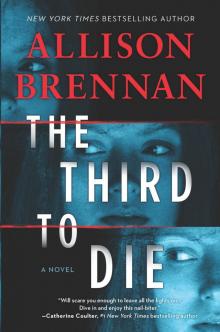 The Third to Die
The Third to Die Nothing to Hide
Nothing to Hide No Way Out
No Way Out Cold as Ice
Cold as Ice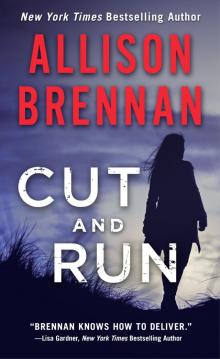 Cut and Run
Cut and Run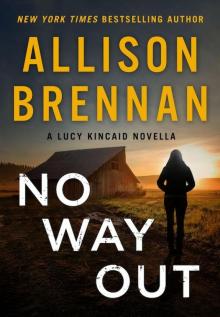 No Way Out (Lucy Kincaid Novels)
No Way Out (Lucy Kincaid Novels) Storm Warning
Storm Warning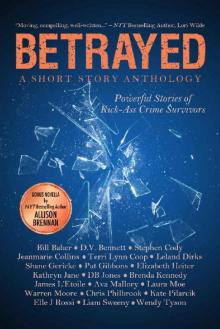 Betrayed: Powerful Stories of Kick-Ass Crime Survivors
Betrayed: Powerful Stories of Kick-Ass Crime Survivors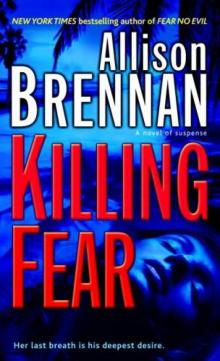 Killing Fear pb-1
Killing Fear pb-1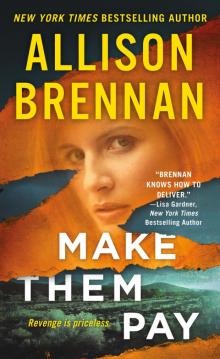 Make Them Pay
Make Them Pay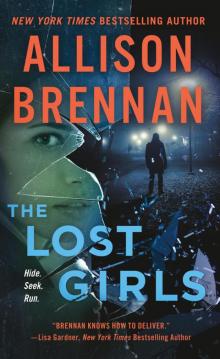 The Lost Girls
The Lost Girls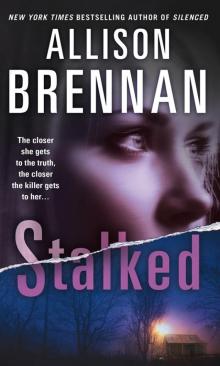 Stalked
Stalked Killing Justice
Killing Justice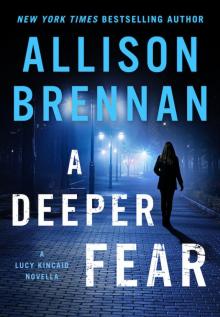 A Deeper Fear
A Deeper Fear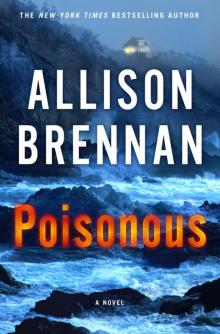 Poisonous
Poisonous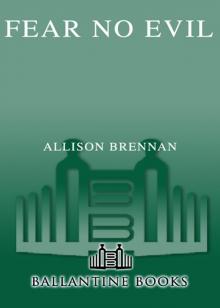 Fear No Evil
Fear No Evil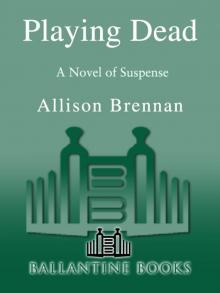 Playing Dead
Playing Dead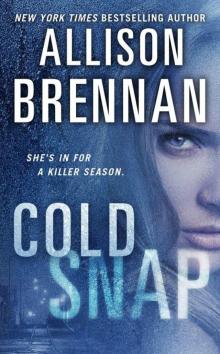 Cold Snap
Cold Snap Vacation Interrupted
Vacation Interrupted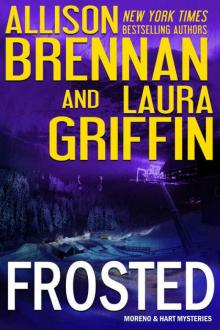 Frosted (Moreno & Hart Mysteries)
Frosted (Moreno & Hart Mysteries)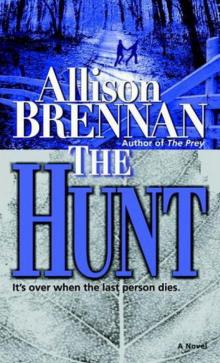 2 - The Hunt
2 - The Hunt Stolen
Stolen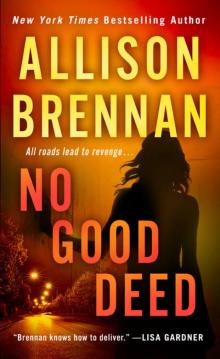 No Good Deed
No Good Deed Cutting Edge
Cutting Edge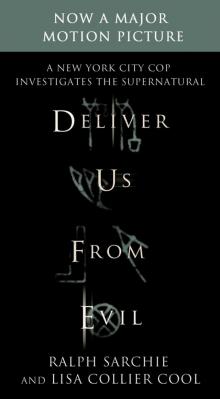 Deliver Us from Evil
Deliver Us from Evil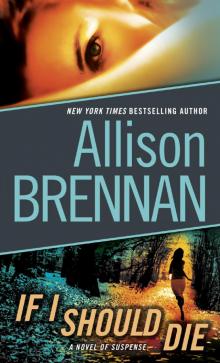 If I Should Die
If I Should Die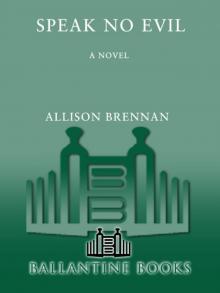 Speak No Evil
Speak No Evil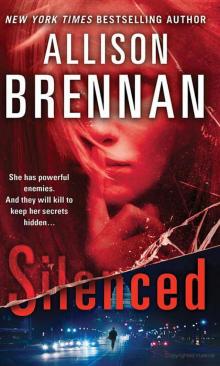 Silenced lk-4
Silenced lk-4 Original Sin sds-1
Original Sin sds-1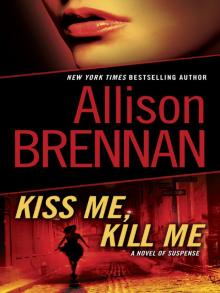 Kiss Me, Kill Me lk-2
Kiss Me, Kill Me lk-2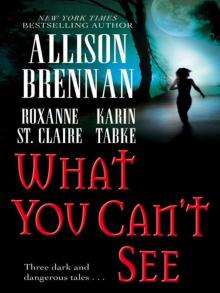 What You Can’t See
What You Can’t See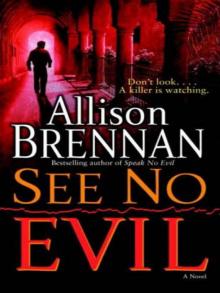 See No Evil
See No Evil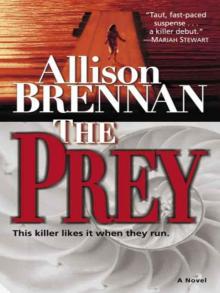 The Prey
The Prey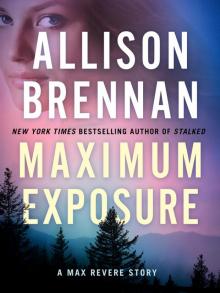 Maximum Exposure
Maximum Exposure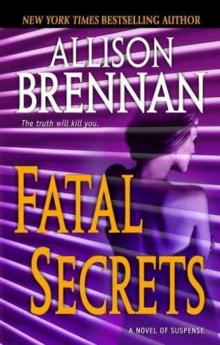 Fatal Secrets f-2
Fatal Secrets f-2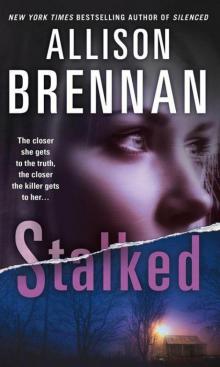 Stalked lk-5
Stalked lk-5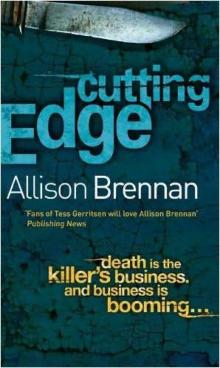 Cutting Edge f-3
Cutting Edge f-3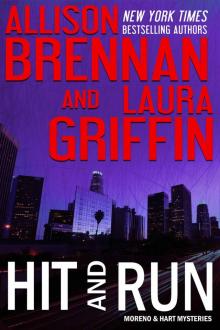 Hit and Run (Moreno & Hart Mysteries)
Hit and Run (Moreno & Hart Mysteries)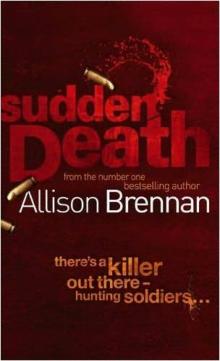 Sudden Death f-1
Sudden Death f-1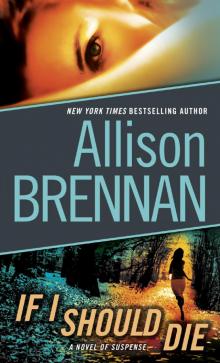 If I Should Die lk-3
If I Should Die lk-3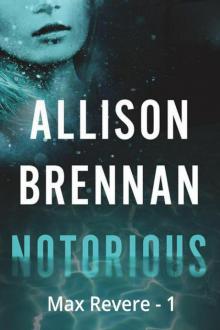 Notorious
Notorious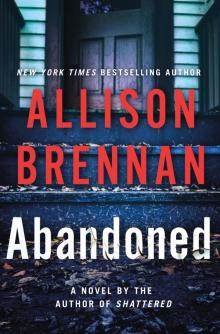 Abandoned
Abandoned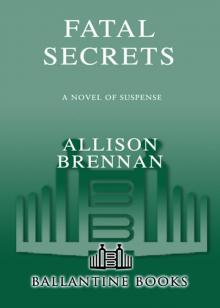 Fatal Secrets
Fatal Secrets The Hunt
The Hunt Carnal Sin sds-2
Carnal Sin sds-2 Love Is Murder
Love Is Murder Lost and Found
Lost and Found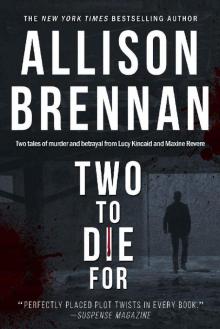 TWO TO DIE FOR
TWO TO DIE FOR Breaking Point
Breaking Point Best Laid Plans
Best Laid Plans Carnal Sin
Carnal Sin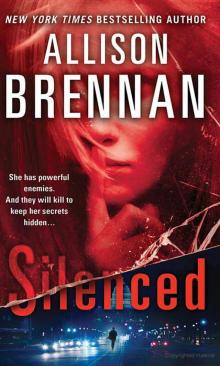 Silenced
Silenced Dead Heat
Dead Heat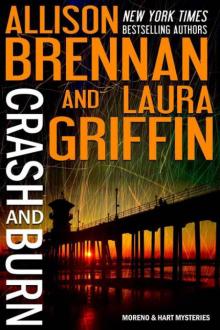 Crash and Burn
Crash and Burn Sudden Death
Sudden Death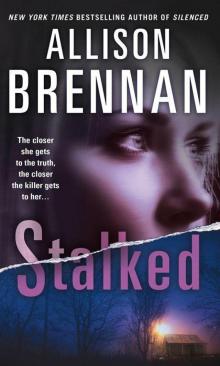 Lucy - 05 - Stalked
Lucy - 05 - Stalked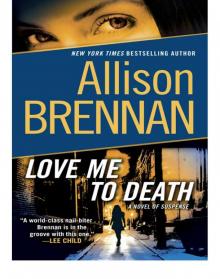 Mortal Sin
Mortal Sin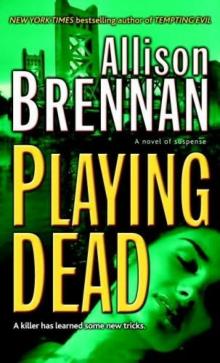 Playing Dead pb-3
Playing Dead pb-3 Kiss Me, Kill Me
Kiss Me, Kill Me Original Sin: The Seven Deadly Sins
Original Sin: The Seven Deadly Sins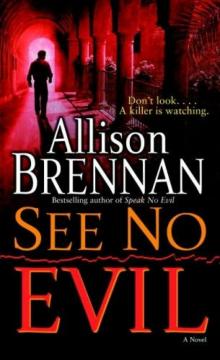 See No Evil e-2
See No Evil e-2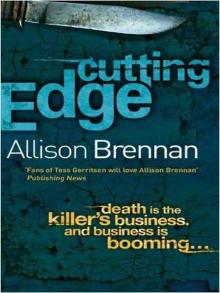 Cutting Edge: A Novel of Suspense
Cutting Edge: A Novel of Suspense Original Sin
Original Sin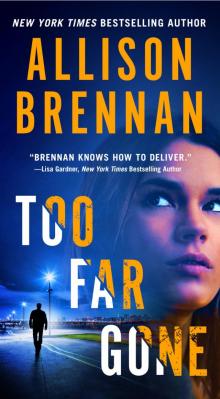 Too Far Gone
Too Far Gone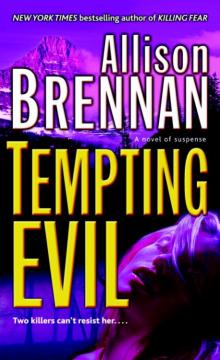 Tempting Evil
Tempting Evil Shattered
Shattered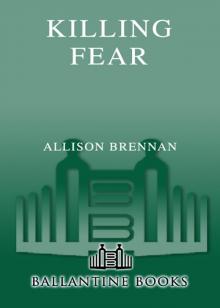 Killing Fear
Killing Fear Murder in the River City
Murder in the River City Love Is Murder (lucy kincaid)
Love Is Murder (lucy kincaid)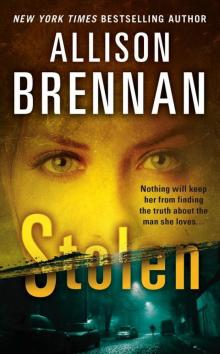 Stolen (Lucy Kincaid Novels)
Stolen (Lucy Kincaid Novels)